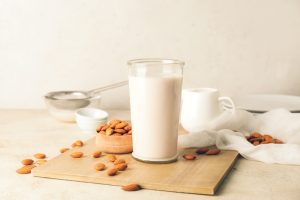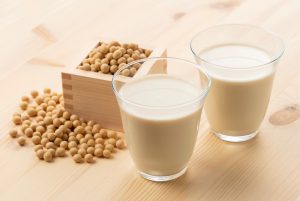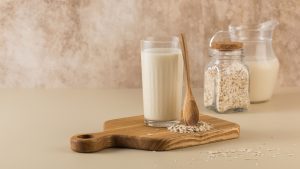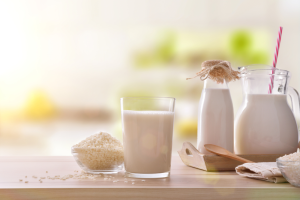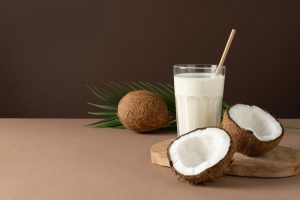What you Want, Find Here ↓
In recent years, plant-based milk has surged in popularity as consumers seek healthier, more sustainable alternatives to dairy milk. From almond to oat to soy, the variety of plant milk available offers something for everyone. However, not all plant milks are created equal when it comes to their environmental impact. Factors such as water usage, greenhouse gas emissions, land use, and biodiversity impact play crucial roles in determining the sustainability of these beverages.
As we become more aware of our environmental footprint, choosing the most eco-friendly plant milk can make a significant difference. This guide will explore the environmental impacts of various plant milks, helping you make an informed decision that aligns with your values and contributes to a healthier planet.
Choosing the best plant milk for the planet.
Choosing the best plant milk for the planet involves considering factors like greenhouse gas emissions, water usage, land use, and biodiversity impact. (1) (2)
Almond Milk
- Greenhouse Gas Emissions: Relatively low compared to dairy.
- Water Usage: High. Almond milk is notorious for its water consumption, requiring about 130 pints of water to produce just one glass.
- Land Use: Moderate. Almonds require significant land but also provide habitat for pollinators.
Soy Milk
- Greenhouse Gas Emissions: Low. Soybeans are efficient at fixing nitrogen in the soil, reducing the need for synthetic fertilizers.
- Water Usage: Moderate. Soybeans require less water than almonds.
- Land Use: Moderate. Soy farming can contribute to deforestation, especially in the Amazon, though most soy used for milk is not sourced from these regions.
Oat Milk
- Greenhouse Gas Emissions: Low. Oats are a cool-weather crop, requiring less energy-intensive inputs. (3)
- Water Usage: Low to moderate. Oats need less water than almonds and soybeans. (4)
- Land Use: Moderate. Oats grow well in diverse climates, reducing the need for deforestation. (5) (6)
Rice Milk
- Greenhouse Gas Emissions: Moderate to high.
- Water Usage: High. Rice cultivation is water intensive. (7) (8) (9) (10) (11)
Coconut Milk
Water Usage: Low. Coconuts require less water compared to other plant milks. (12)
Land Use: Low to moderate. Coconut trees can be grown on marginal lands and contribute to soil health. (13) (14) (15)
Hemp Milk
Greenhouse Gas Emissions: Low. Hemp absorbs CO2 effectively.
Land Use: Low to moderate. Hemp grows densely, requiring less land. (16)
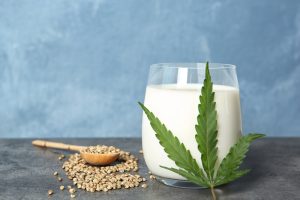
OUTLINE
While all plant milk is generally more environmentally friendly than dairy, oat, and hemp milk tend to have the lowest overall environmental footprints. Always consider choosing organic and sustainably sourced options to further reduce your environmental impact.
Reliable plant milk companies
When looking for sustainable plant milk companies, it’s important to consider their environmental practices, sourcing methods, and overall commitment to sustainability. Here is a company known for their sustainable and environmental impact. (17)
Practices in producing plant milk:
Oatley
- Products: Oat Milk
- Sustainability Initiatives: Oatley uses oats that require less water and fewer resources compared to other crops. The company is also transparent about its environmental impact and works to reduce its carbon footprint.
- Certifications: Oatley is committed to sustainable farming practices and has several environmental certifications.
Ripple Foods - Products: Pea Milk (18)
- Sustainability Initiatives: Ripple Foods focuses on using yellow peas, which have a lower environmental impact compared to other plant-based options. Peas require less water and help enrich the soil with nitrogen.
- Certifications: Ripple Foods is a Certified B Corporation, which means it meets high standards of social and environmental performance, accountability, and transparency.
Califia Farms
ilia Farms emphasizes sustainable sourcing and water-efficient farming practices. They use renewable energy in their production facilities and focus on reducing waste.
Certifications: Califia Farms is also a Certified B Corporation, committed to social and environmental responsibility.
MALK Organics
- Products: Almond Milk, Oat Milk
- Sustainability Initiatives: MALK Organics uses organic ingredients and avoids the use of thickeners, preservatives, and artificial flavors. Their products are also packaged in environmentally friendly containers.
- Certifications: USDA Organic, Non-GMO Project Verified.
Elmhurst 1925
- Products: Almond Milk, Oat Milk, Cashew Milk, Hazelnut Milk, Walnut Milk
- Sustainability Initiatives: Elmhurst 1925 focuses on sustainability through its use of minimal ingredients and water-efficient nuts. The company also uses a unique Hydro Release method to make its milk, which maximizes the nutritional value of the ingredients.
- Certifications: Non-GMO Project Verified, certified vegan, and gluten-free.
Pacific Foods
- Products: Almond Milk, Cashew Milk, Hemp Milk, Oat Milk, Soy Milk
- Sustainability Initiatives: Pacific Foods prioritizes sustainable farming practices and responsible sourcing. They also use eco-friendly packaging and are involved in various community initiatives.
- Certifications: USDA Organic, Non-GMO Project Verified.
Forager Project
- Products: Cashew Milk, Oat Milk
- Sustainability Initiatives: The Forager Project focuses on organic and sustainable farming practices. They are committed to reducing their environmental footprint and support various social and environmental causes.
- Certifications: USDA Organic, Non-GMO Project Verified.
Good Karma Foods
- Products: Flax Milk
- Sustainability Initiatives: Good Karma Foods uses flaxseed, which requires less water and promotes soil health. The company is also committed to ethical sourcing and reducing its carbon footprint.
- Certifications: Non-GMO Project Verified, vegan, and free from major allergens.
These companies are recognized for their commitment to sustainability and environmental responsibility in producing plant-based milk alternatives. When choosing a product, it’s beneficial to support brands that prioritize sustainable practices and transparent sourcing.
OUTLINE
These companies stand out for their commitment to sustainability through various practices, including:
Sourcing ingredients from sustainable and organic farms.
Reducing water usage and improving water conservation.
Lowering greenhouse gas emissions and energy consumption.
Using recyclable and sustainable packaging materials.
Promoting transparency and ethical practices.
Choosing products from these companies can help reduce your environmental footprint and support more sustainable agricultural practices.
Environmental Impacts
Evaluating the environmental impacts of nondairy milk involves examining various factors, including water usage, land use, greenhouse gas emissions, biodiversity impact, and processing. Here’s a detailed evaluation of some popular nondairy milk. (19)
Water Usage
Almond Milk: A significant amount of water to grow almonds. On average, it takes about 1.1 gallons (5 liters) of water to produce a single almond. California, a major almond-producing region, faces water scarcity, making almond milk less sustainable in terms of water usage.
Oat Milk: Oats are relatively water efficient.
Soy Milk: Soybeans require moderate amounts of water. Producing a liter of (20) soy milk requires about 28 liters of water.(21)
Hemp Milk: Hemp is a water-efficient crop, generally requiring less water than almonds and soybeans. (22)
Coconut Milk: Coconuts require a moderate amount of water, but they are typically grown in tropical regions where water scarcity is less of an issue. (23)
Land Use and Deforestation
- Soy Milk: Soy cultivation can lead to deforestation, especially in the Amazon. However, most soy for milk production is sourced from regions with less impact on forests.
- Oat Milk: Oats are typically grown in cooler climates and do not require deforestation. They also have a low land use footprint.
- Hemp Milk: Hemp grows quickly and densely, requiring less land than many other crops.
- Coconut Milk: Coconut farming can contribute to deforestation in tropical regions, but it generally uses less land than soy cultivation.
- Almond Milk: Almond trees have a relatively high land use, particularly in areas where they compete with native vegetation for resources.
Greenhouse Gas Emissions
Almond Milk: Almond trees absorb CO2, but water-intensive cultivation and transportation contribute to higher greenhouse gas emissions. (24) (25)
Oat Milk: Oat milk has one of the lowest carbon footprints among plant milks, as oats require fewer inputs and produce less methane and nitrous oxide.
Soy Milk: Soybeans can fix nitrogen in the soil, reducing the need for synthetic fertilizers, which helps lower greenhouse gas emissions. (26) (27)
Hemp Milk: Hemp is effective at sequestering carbon dioxide, contributing to a lower carbon footprint.
Coconut Milk: While the cultivation of coconuts has a relatively low carbon footprint, processing and transportation (often from tropical regions) increase overall emissions.
Biodiversity Impact
Soy Milk: Large-scale soy cultivation can impact biodiversity, especially in regions where it replaces natural habitats.
Oat Milk: Oats generally have a lower impact on biodiversity since they are often grown in rotation with other crops, reducing monoculture effects.
Hemp Milk: Hemp farming can benefit biodiversity as it often requires fewer pesticides and can improve soil health. (28)
Coconut Milk: Coconut plantations can affect local biodiversity, particularly if they replace diverse tropical forests.
Almond Milk: Almond orchards can impact local ecosystems, particularly in regions where they displace native vegetation. (29)
Processing and Transportation
Local Sourcing: Opting for locally sourced plant milk can reduce transportation emissions. Some plant milks, like oat and soy, are more likely to be produced locally in temperate regions.
Summary of Environmental Impacts
- Best Overall: Oat Milk is generally considered the most eco-friendly due to its low water usage, minimal land use, and low greenhouse gas emissions.
- Close Contenders: “Hemp Milk” and “Soy Milk” also offer sustainable options, each with specific environmental advantages.
- Higher Impact: “Almond Milk” has high water usage, and “Coconut Milk” can have significant impacts on tropical ecosystems and higher transportation emissions.
By considering these factors, consumers can make informed decisions about the environmental impacts of their plant milk choices. Opting for brands that prioritize sustainable practices and local sourcing can further reduce the environmental footprint.
Method to make plant milk at home
Making plant milk at home is a simple and rewarding process. Here’s a general method to make various types of plant milk, such as almond, oat, soy, and cashew milk. The basic process involves soaking, blending, and straining. Here’s a step-by-step guide:
Ingredients
– 1 cup of raw nuts, seeds, or grains (e.g., almonds, oats, soybeans, cashews)
– 4 cups of water (for blending)
– Additional water for soaking (if required)
– Sweeteners or flavorings (optional, e.g., vanilla extract, dates, honey, salt)
Equipment
– Blender
– Nut milk bag, or fine-mesh strainer
– Large bowl
– Airtight container for storage
General Steps
1. Soak (if required)
Almonds/Cashews: Soak in water for 7-12 hours or overnight. This makes them easy to blend (30)
Oats: No soaking is required, but you can soak for 15-30 minutes to reduce phytic acid. (31)
Soybeans: Soak in water for 8-12 hours or overnight. This helps to remove the hulls and makes blending easier.
Rinse
-After soaking, drain and rinse the nuts, seeds, or grains thoroughly under cool running water.
Blend
-Combine the soaked nuts, seeds, or grains with 4 cups of fresh water in a blender.
-Blend on high for 1-5 minutes until the mixture is smooth and creamy.
Strain
mesh strainer over a large bowl.
Pour the blended mixture into the bag, cloth, or strainer.
Squeeze and press with clean hands to extract as much liquid as possible.
Sweeten/Flavor (optional)
– If desired, return the strained milk to the blender and add sweeteners or flavorings. Blend briefly to combine.
– Sweeteners: dates, honey, maple syrup
– Flavorings: add vanilla, a pinch of salt
Store
– Pour the plant milk into an airtight container and refrigerate.
– Homemade plant milk typically lasts for 2-5 days in the fridge. Shake it well before each use,
Specific Notes for Different Plant Milk
Almond Milk: Rich and creamy. Best when soaked overnight. Can be flavored with vanilla or sweetened with dates. (32)
Oat Milk: Creamy and slightly sweet. Blend for a shorter time to avoid sliminess. Strain through a fine cloth to reduce grit.
Soy Milk: High in protein. Boil the soaked beans for 15-20 minutes before blending to remove the beany taste. Strain well. (33)
Cashew Milk: Very creamy and does not require straining if blended well. Perfect for coffee or creamy recipes.
Enjoy your homemade plant milk in smoothies, coffee, cereal, or as a refreshing drink on its own!
Conclusion
Best Overall: Oat Milk stands out for its low environmental impact across most categories, making it a sustainable choice.
Honorable Mention: Hemp Milk also ranks highly due to its low resource requirements and positive impact on biodiversity.
While all plant milk is generally more environmentally friendly than dairy, oat, and hemp milk tend to have the lowest overall environmental footprints.
The bottom line
The bottom line for making and choosing plant milk involves considering both environmental impact and personal preference. Here are the key takeaways:
Environmental Considerations
Water Usage:
Almond milk has the highest water usage.
Oat, soy, and hemp milk generally require less water.
Greenhouse Gas Emissions:
Rice milk has moderate to high emissions due to methane production.
Oat and hemp milk have lower emissions.
Land Use:
Almond and soy milk can contribute to deforestation and require significant land.
Oats and hemp are more land-efficient and often grown in diverse climates.
Biodiversity Impact:
Large-scale almond farming can harm bee populations.
Oats and hemp have lower negative impacts on biodiversity.
Sustainable Choices
Oat Milk: It, is easy to make plant milk at home.
Hemp Milk: Environmentally friendly, supports soil health and biodiversity.
Soy Milk: Efficient and nutritious but choose brands that avoid contributing to deforestation.


